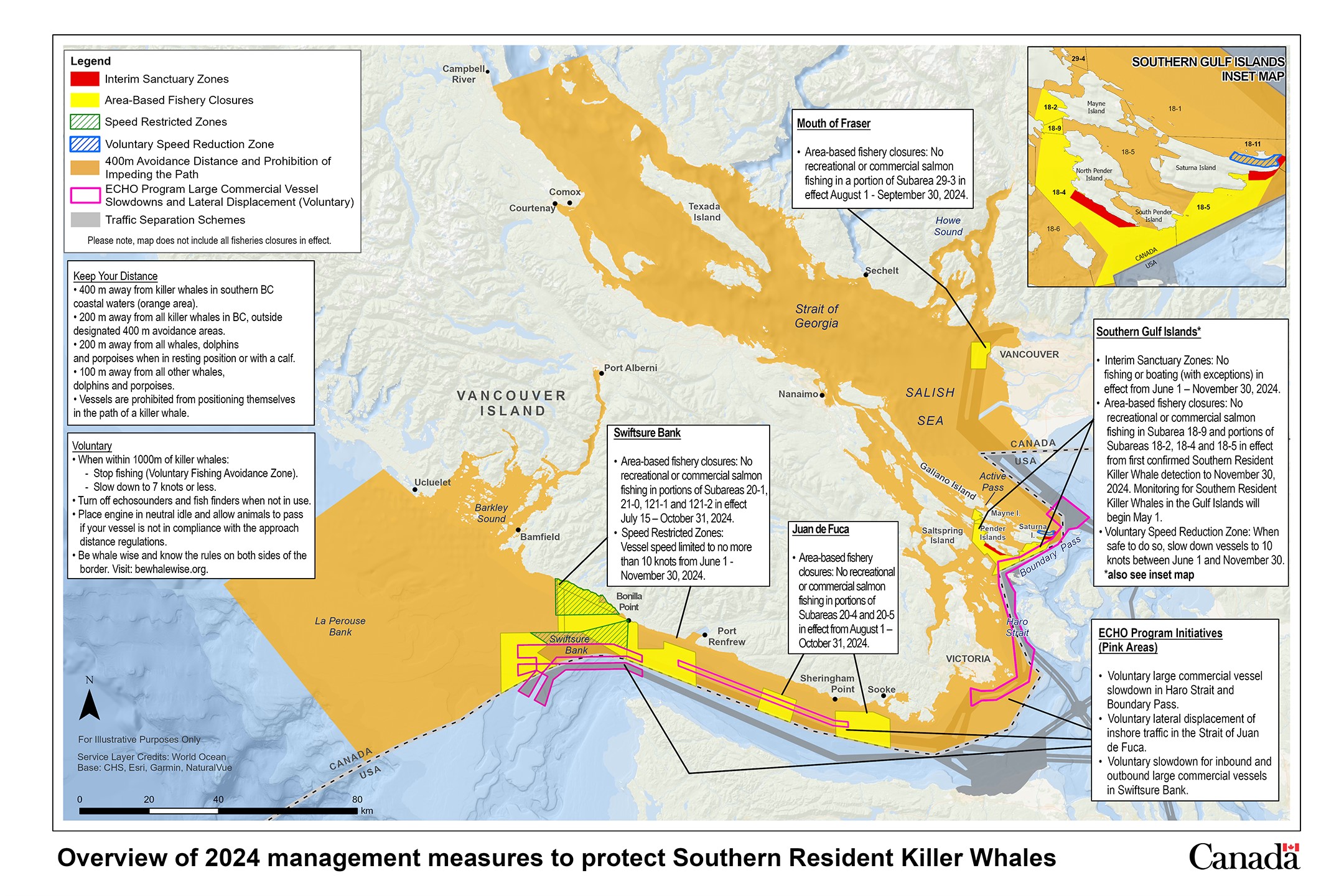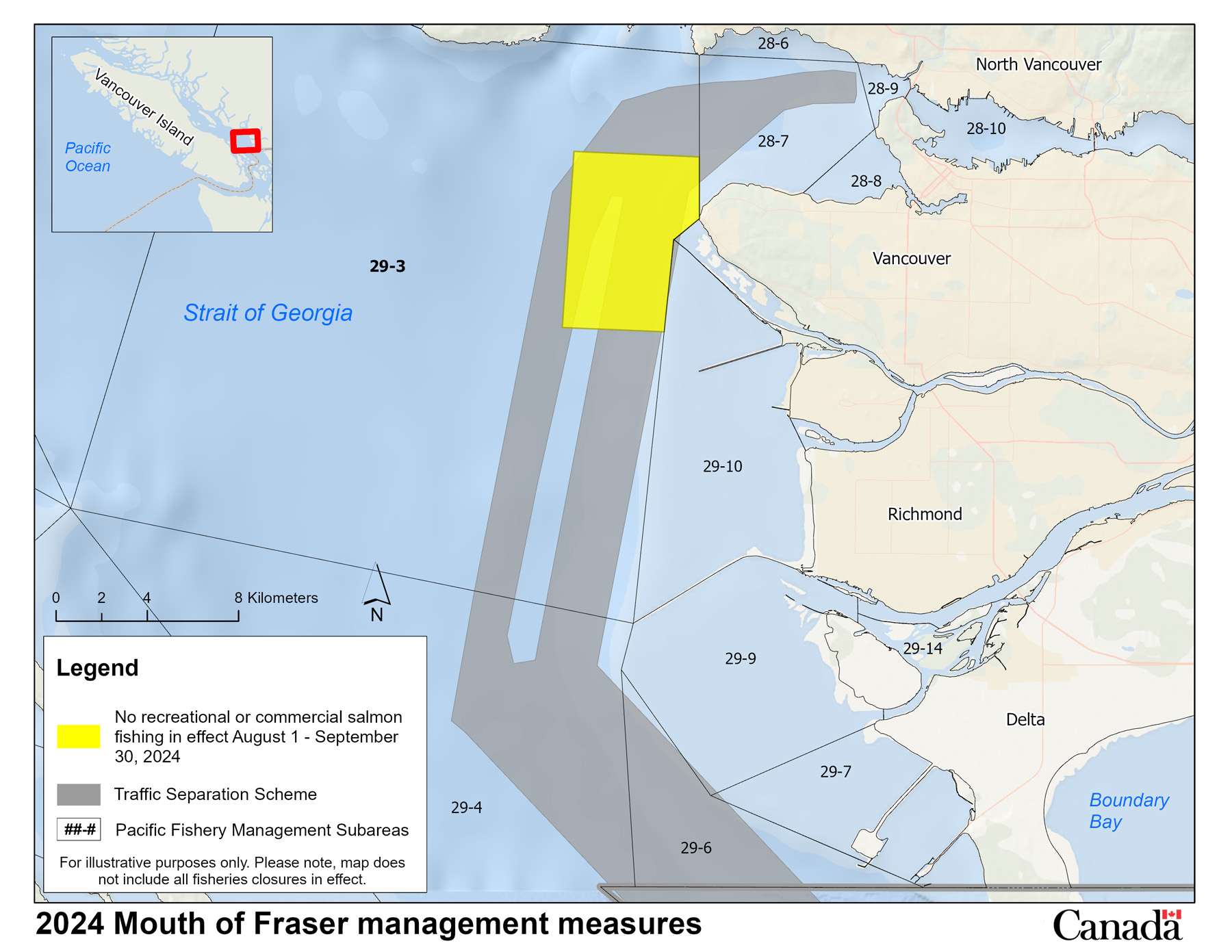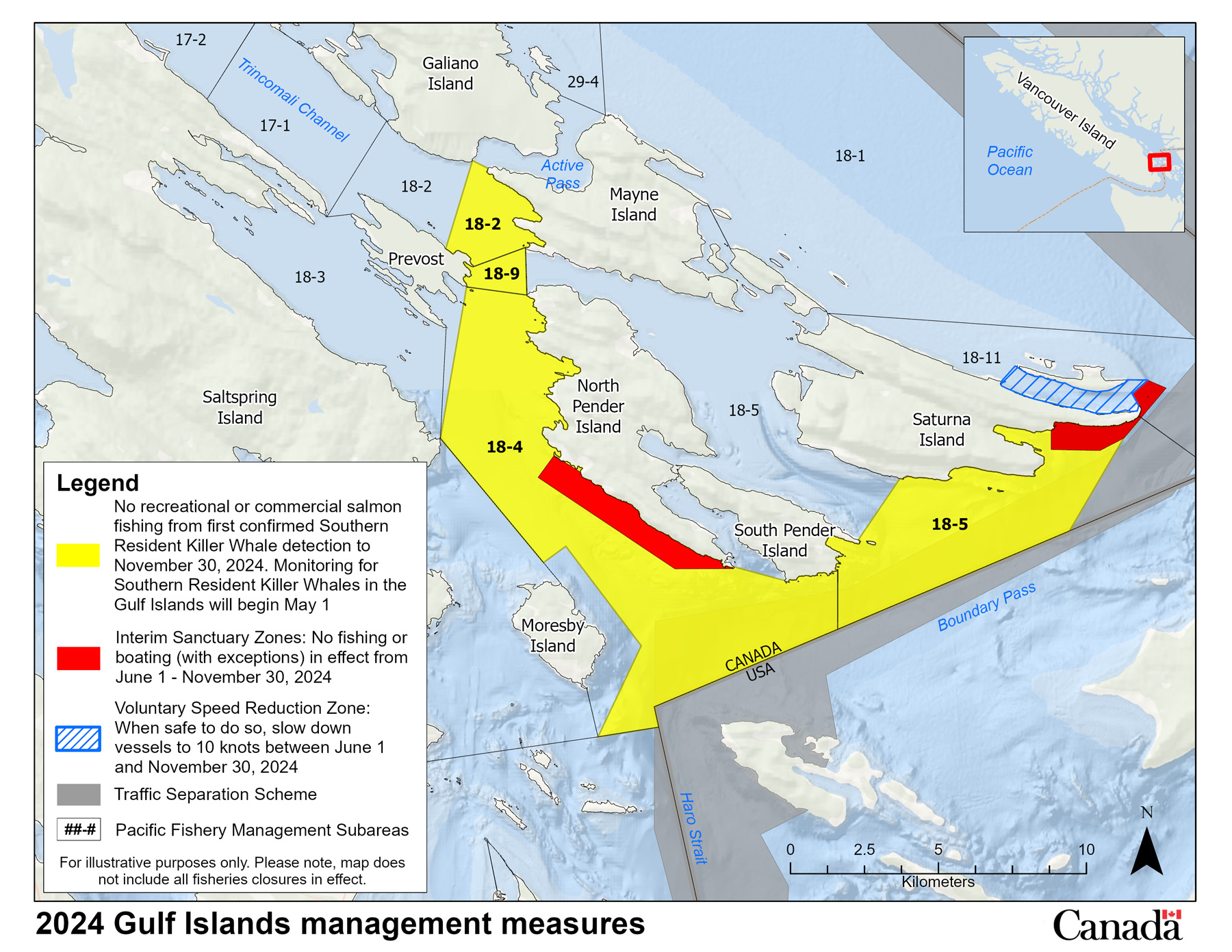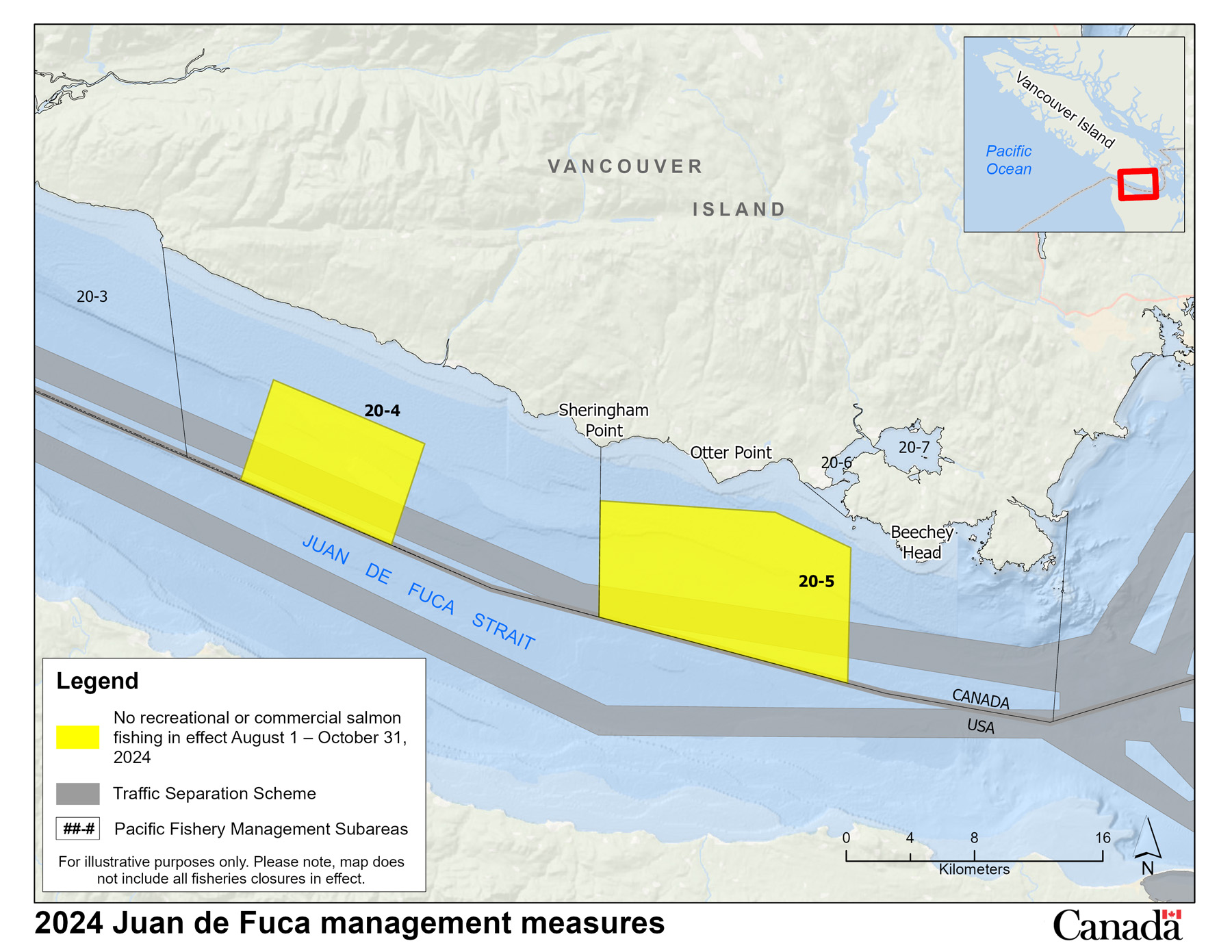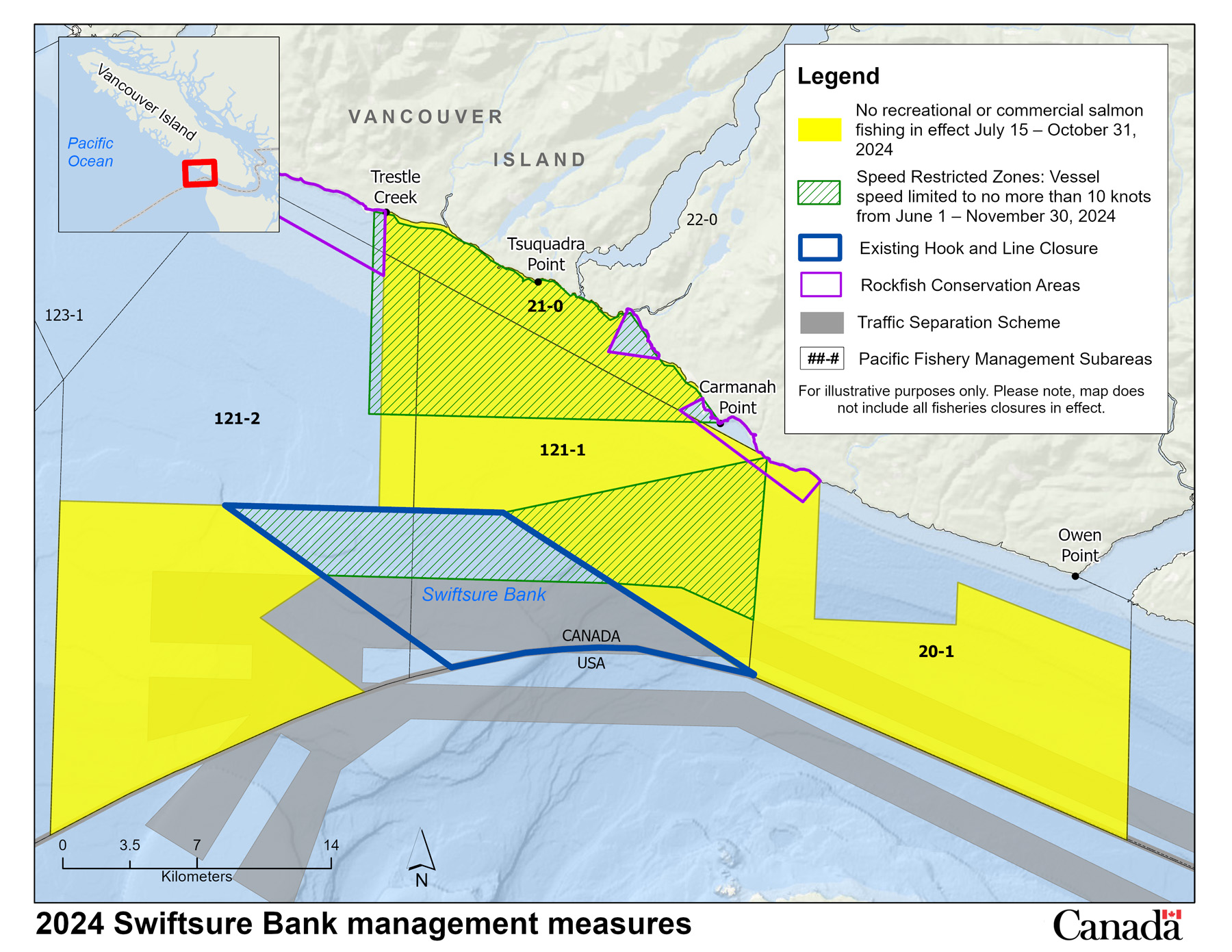2024 management measures to protect Southern Resident killer whales
Southern Resident killer whales have important cultural significance for Indigenous Peoples and coastal communities in British Columbia. These iconic animals face imminent threats to their survival and recovery. Protecting them requires comprehensive and immediate action.
The 3 primary threats to Southern Resident killer whales are:
- reduced prey availability and accessibility
- acoustic and physical disturbance
- contaminants
Canada has laws and regulations in place to address these threats and support the survival of this species, and there are voluntary measures that you can take as well. Effectively ensuring the protection and recovery of Southern Resident killer whales requires a long-term, collective effort. These measures reflect current science and advice from First Nations, Stakeholders, the Indigenous Multi-Nation Group, Indigenous and Multi-Stakeholder Advisory Group, Technical Working Groups, and from public consultations.
Regulations to support Southern Resident killer whales
You must follow Canada's laws and regulations to protect Southern Resident killer whales.
Maps of management measures
Maps show an overview of measures by geographic area. Further details explaining the measures follow.
Area-based fishing closures
Chinook salmon are a vital food source for Southern Resident killer whales but wild chinook have declined dramatically in recent years. Fishery management measures aim to help increase the availability of salmon in key Southern Resident killer whale feeding areas.
The following areas will be closed to salmon fishing by both commercial and recreational harvesters.
- July 15 to October 31 around Swiftsure Bank
- August 1 to October 31 in parts of the Juan de Fuca Strait
- August 1 to September 30 in the mouth of the Fraser River
- May 8 to November 30 in the southern Gulf Islands
Fishers are also asked to voluntarily stop fishing (do not haul gear) within 1000m of killer whales in all Canadian Pacific waters as a best practice in the presence of killer whales to reduce competition for their food and to minimize disturbing the animals.
Interim Sanctuary Zones
Interim Sanctuary Zones are in effect from June 1 to November 30 in important areas for Southern Resident killer whales to further reduce acoustic and physical disturbance from vessels.
Vessel traffic (including fishing) will be prohibited in Interim Sanctuary Zones off North Pender and Saturna Islands as per the Interim Order enacted under the Canada Shipping Act. Some exceptions will apply, including emergency situations, vessels engaged in Indigenous food, social and ceremonial fisheries or Indigenous Peoples exercising existing rights.
New for this year, a voluntary Speed Reduction Zone is being implemented in Tumbo Channel. Vessels should reduce speed to no more than 10 knots in this area, when safe to do so.
Speed Restricted Zones
From June 1 until November 30, all vessels are required to slow down to a maximum of 10 knots around Swiftsure Bank:
- In a portion of Subarea 121-1
- In portions of Subareas 121-1, 121-2 and 21-0: near the mouth of the Nitinat River from Carmanah Point to Longitude 125 degrees west
Some limited exceptions may apply. This measure is mandatory and separate from the voluntary slowdowns for large commercial vessels coordinated by the ECHO Program.
Avoiding whales
Vessels must stay 400m away and may not position a vessel in the path of killer whales in southern BC coastal waters between Campbell River and just north of Ucluelet until May 31, 2025, as per the Interim Order enacted under the Canada Shipping Act. Vessels with a purple ‘Authorized Vessel’ (AV) flag are allowed to be closer to non-Southern Resident killer whales. Do not follow them.
The Marine Mammal Regulations remain in effect year-round. This requires staying:
- 200 metres away from all killer whales in Canadian Pacific waters other than those described above
- 200 metres away from all whales, porpoises and dolphins when in resting position or with a calf
- 100 metres away from other whales, porpoises and dolphins
Voluntary measures to protect Southern Resident killer whales
As well as following Canada’s laws and regulations, there are also voluntary measures that you can take to support the survival of Southern Resident killer whales anytime you’re on or near the water.
- Stop fishing (do not haul gear) within 1000m of killer whales
- Reduce speed to less than 7 knots when within 1000m of the nearest killer whale
- When safe to do so, turn off echo sounders and fish finders
- If you are too close to a whale, place engine in neutral idle and allow animals to pass.
- For more information on the best ways to help whales while on the water, on both sides of the border, please visit: bewhalewise.org
Stay up-to-date on the Government of Canada’s actions to protect Southern Resident killer whales by signing up to receive Parks Canada’s e-bulletin
Contaminants
The Government of Canada continues to address the threat of contaminants by strengthening regulations and enforcing them, developing guidelines, and increasing research and monitoring. We are now better able to understand the source and quantity of contaminants affecting Southern Resident killer whale and their prey, and to focus our prevention efforts in consequence. As part of our effort to share information and data, the Pollutants Affecting Whales and their Prey Inventory Tool (PAWPIT), an interactive pollutant mapping tool, is available. The tool shows estimates of pollutant releases by all identified sources within a spatial extent that includes the habitats of Northern and Southern Resident killer whales and freshwater areas important for Chinook salmon. The tool also displays estimated ambient contaminant loads in the Fraser River Basin, indicates where environmental quality guidelines were exceeded, and provides the locations of un-remediated contaminated sites.
Related links
- Watching marine wildlife
- Parks Canada: Southern Resident killer whale outreach
- Reducing the threat of contaminants to Southern Resident killer whales
- Reports, publications and videos related to the protection of Southern Resident killer whales
- Poster: Know before you go — Vessel flags
- Managing marine mammals in Canada’s Pacific region - an integrative management framework
- Monitoring and closure period for salmon fisheries closure protocol in the southern Gulf Islands based on Southern Resident killer whale presence
- Date modified:
